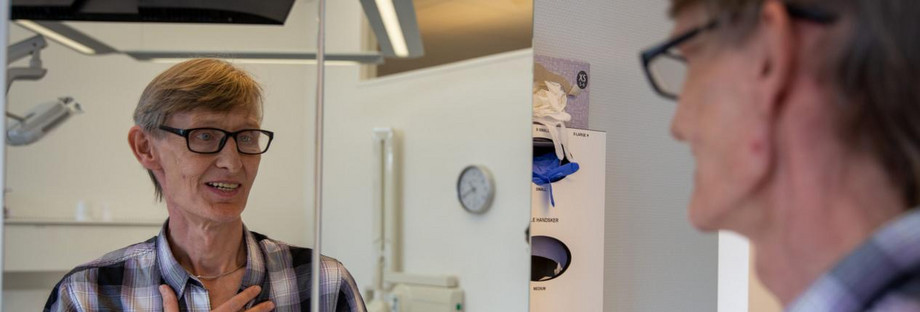New teeth equals new opportunities for the socially disadvantaged

29.08.2022 l More news
“A smile is the shortest distance between two people,” goes the saying, but for the socially disadvantaged, a smile can actually widen that distance if your teeth show signs of neglect and substance abuse. At Tandrødderne in Ballerup, Copenhagen, more than 20 volunteer professionals offer free dental care to former and current drug addicts, and with a grant from VELUX FONDEN, they can now offer dental prostheses to those who want them.
“In theory, dental care is available to everyone in Denmark, but in reality, our most socially disadvantaged citizens cannot always be accommodated at the clinics, and the social care system does not focus sufficiently on dental care. So, they end up between two chairs – and fortunately we can help some of them here at the clinic.”
Parly Jakobsen, a dentist, heads the association Tandrødderne, which is run by volunteers. The association’s mission is to offer free dental care to socially disadvantaged citizens at its clinic in the Copenhagen suburb of Ballerup. The patients are all either active or recent addicts, and they are mainly referred to Tandrødderne from the local addiction centres ‘Brydehuset’ and ‘Valmuen’. Tandrødderne also collaborates with a number of refuges for abused women, where the dentists step in if emergency treatment is required.
Tandrødderne was established in 2013 by the dentist Jørgen Lætgaard, who had previously provided voluntary dental treatment at ‘Mændenes Hjem’, which offers shelter, meals and a range of social services for men on Vesterbro in the Danish capital. Supported by the Municipality of Ballerup and VELUX FONDEN, he started the clinic in Ballerup as a project which, since 2016, has been run as a permanent establishment with funding from the municipality, foundations and sponsors.
Time for coffee and laughterThe volunteer staff at Tandrødderne always have time for a coffee, a laugh and a chat, and welcome the patients just the way they are, says Parly Jakobsen:
“The point of the clinic is to treat people like them, and it makes a huge difference that we know their problems and are able to handle them, because there’s a lot of stigma associated with substance abuse.”
At least an hour is allocated for each appointment, which allows plenty of time to get from the waiting room and into the dentist’s chair. The most important thing is that our patients feel safe, and if they only feel like a chat and can’t face treatment that day, then that’s OK, says Parly Jakobsen:
“Some of our patients have been trying for several years to get their teeth fixed, so we don’t want to lose them when they’ve finally made it here. So, if what was planned is too much for them, then we see how far we get, and otherwise make a new appointment for them. Our motto is ‘arrive happy and leave happier’, and we all try to live by this, both patients and volunteers.”
Active volunteersMore than 20 volunteer dentists, dental assistants and dental hygienists staff the clinic. They include students and newly qualified dentists, but the majority are retired dentists and dental assistants, says Parly Jakobsen:
“Our most stable volunteers are pensioners who are not quite ready to put down their tools, and who would like to make their expertise available here. They’re worth their weight in gold to us, because we need their expertise and experience.”
In Denmark, the authorisation to practice independently as a dentist is withdrawn once dentists reach the age of 75, and even though it is possible to obtain an extension, many choose to retire.
“We have many volunteers in their early 70s, and they’re good at deciding for themselves when to stop if they do so before turning 75. We’ve had a few who doubted their own professionalism and standards, and they therefore stopped, but we’ve never had to ask anyone to stop working here. People keep going for as long as they can, and feel they have something to offer,” says Parly Jakobsen.
Grant for dental prosthesesThe clinic’s older volunteers now have a new role after Tandrødderne applied for and received another grant from VELUX FONDEN in 2021 – this time with the sole aim of being able to offer patients dental prostheses. While many of the clinic’s materials are donated or purchased at a discount, dental prostheses are expensive to make, which means that the clinic has sometimes had to turn down patients wanting dentures. However, that is no longer the case, and this is where our older volunteers are an invaluable resource, says Parly Jakobsen:
“In general, fewer and fewer dentures are being made because most people have healthier teeth – and this means that younger dentists simply don’t have enough experience in this area. I’m in my 50s, and have very limited experience with false teeth, so we really need the older dentists. Therefore, patients needing dentures are always looked after by one of our retirees.”
Parly Jakobsen and his colleagues find that their work makes a huge difference to their patients, and this motivates them to continue their voluntary work:
“People are always so happy that we can help – whether they want a completely new set of teeth or just their tooth ache to go away. And the gratitude you get from the users, that feeling of having done a good deed, and perhaps helped them to face the world in a slightly better way – it’s fantastic. I think that’s how we all feel. You always go home from the clinic with more energy than when you arrived.”